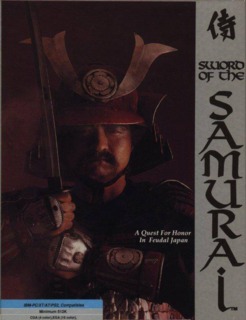And old goodie
This is my first ever review, plz go easy on me.
Sword of the Samurai is a combination of strategy, adventure, and action.
There are many different layers of gameplay, such as dueling (designed by Sid Meier himself!), real-time battles, an action based "melee", simple empire building, simple questing, strategy on many levels, some RPG elements, and simple character interaction.
There are a bunch of different modes of play, such as the main game, and some quick duels, melees, and battles. But the main focus is on the main game, and the other modes are simply taken out of it.
The objective in the main game is to become the great ruler of Japan, the Shogun.
You start out as a lowly samurai, the owner of a small fief. You choose your difficulty, there's around eight different difficulty levels. You choose your starting clan from the map of Japan, that will effect your clan's stats and starting position (seriously, you can choose from almost anywhere in Japan). Finally, you choose what talent you get a bonus in (much like Pirates!), then start the game.
You're greeted by your Hatamoto (that's your local lord), and three other rivals. You see their stats, and then your own. Once the game really starts, you can choose to hire more samurai, practice dueling, train your soldiers, donate land to the local temple, and go exploring by yourself, testing yourself against fate, at the head of your army, or traveling as a disguised ronin. You can also save, check the map of Japan, see if there are any current quests available or campaigns available, or look at your and your rival statuses and stastistics.
You're probably going to hire soldiers first, then go exploring the countryside. Along the way, you might have a random encounter with a fellow swordsmen, with which you duel, or a random melee encounter; where you take only your sword and bow and take on a group of maruders.
You can visit the estate of your Hatamoto, and also those of your rivals.
Your character slowly ages over time, so you'll need to marry eventually; your eldest son will succeed you, and another lord may ask for your daughter's hand.
There's three modes of combat in SotS: Dueling, Melee, and Battle.
In a duel, you're pitted against another swordsman, and you need to take him out. In melee, you're using your sword and bow to take out a bunch of guys. In a land battle, you send your forces into battle, you being the general yourself, and take on the enemies in real-time.
You gain a better reputation for heroic acts, while the shadier acts will give you a bad reputation. You can sneak into the castle of your lord or rival, and assasinate him, or do one of the many other things of this "shady" nature.
Eventually, due to whatever reasons, the Hatamoto dies, and the strongest and most honorable samurai is elected (this is naturally what you want to happen to yourself). You now are greeted by your local Daimyo, and your three new rivals. Gameplay goes on now much the same as before, except now each unit symbol is worth more units (at the start of the game, each unit on the battlefield is worth 1-2 soldiers, now it's around 25, later much more, leading to battles of thousands of units engaged). Your personal castle is bigger now, as is that of your daimyo and your rivals (these are different rivals than before, these are Hatamotos as well).
Eventually, the Daimyo dies, and it's now a face-off between the two strongest (although occasionally, the strongest is so powerful that all three of his rivals are too scared of him). Let's say that you are the most powerful. The second strongest guy now decides that he, not you, will be Daimyo. The other two guys take sides. You then have to engage his forces in battle. If you win, then you become Daimyo; if you lose, then you're out of the game.
Up to this point, (about halfway through the game), you've been in your individual province (though you can travel to other provinces), and it's all been like an adventure game most of the time. You're now switched to a political map of Japan, and you take your place among the warring Daimyos who are all trying to conquer the entire place and become Shogun.
You try and conquer the enemy provinces, slowly but surely your armies become stronger and stronger. As you take over the territories of your opponents, sometimes the people will revolt, and these rogue daimyos can be annoying, but it's quite realistic.
Something that's worth mentioning is that after your character becomes too old, you retire him (or he simply dies), your heir succeeds. You want to marry this one too, and get an heir to him as well. If the game lasts long enough, you'll have played through a whole dynasty (though not a very long one).
Eventually, when you've conquered around 1/2 of Japan, you get the option to declare yourself Shogun at any time. You can either continue conquering the entire place, or declare yourself, then the other lords band together against you and you fight them in a massive battle. If you win, then you become Shogun, if you lose, then you're out of the game.
When you do finally become Shogun, you've accomplished your task, and you learn a little about what happens in the rule of your dynasty. You want it to last as long as possible, depending on how well you did, that decides how long your empire lasts. Your score and the length of time your empire endures is entered in a scoreboard that you can look at at any time.
Overall, Sword of the Samurai is an underappreciated classic that shouldn't be overlooked. I hope I haven't gone into too much detail, but this game deserves a perfect 10.0.
Belegorm

